In a contribution to the international PR Measurement Week, regional practitioners attended an evening training session in The Media School on September 16.
The public engagement event was organised by Professor Tom Watson and Wessex Chartered Institute of Public Relations (CIPR) chair Natasha Tobin, who lectures part-time on the BA Public Relations programme. It was attended by 14 CIPR members, who also gained CPD points for their annual professional training quota.
The practitioners were shown basic media measurement techniques using an Excel utility which Professor Watson has developed. It features in the third edition of ‘Evaluating Public Relations’ (Kogan Page 2014) co-written with former BU lecturer Paul Noble.
“Measurement and evaluation is one of the top PR practice issues and we were pleased to organise hands-on training for regional PR people as part of the international week,” said Professor Watson. “BU has had a long relationship with CIPR since BAPR was started in the late 1980s and so they were natural partners for this initiative.”
Measurement Week has been organised around the world by the Association for the Measurement and Evaluation of Communication (AMEC) and has the support in the UK of CIPR and the Public Relations Consultants Association (PRCA, which both recognise BU’s public relations courses.
Category / Creative, Digital & Cognitive Science
£1million in digital healthcare innovation available from Creative England
- 5 x £50,000 investments will be made.
- Companies must be based in the North, Midlands or South West.
- Examples of projects could be improving quality of care; caring for people with dementia; supporting people with long-term conditions; and data visualisation.
- Mobile apps, development of a new game for tablet or mobile are also eligible.
Applications will be assessed on a rolling basis and the fund will close on 31 October 2014.
More information can be found here.
Alternatively please feel free to contact
Jayne Codling – Knowledge Exchange Adviser
Ext 61215 jcodling@bournemouth.ac.uk
PR historians meet in Brussels
Plans for future joint research were discussed at a meeting of the European Public Relations History Network (EPRHN) in Brussels on September 12.
The network, which was established with Fusion Fund assistance in 2013, met during the annual EUPRERA Congress and was attended by 15 PR historians from Belgium, France, Germany, Netherlands, Spain, Turkey and England.
In addition to developing joint bids to national and European funding sources, EPRHN members have been contributing to a PR history book series which is being edited by Professor Tom Watson of the Media School.
Other plans are research into WW1 propaganda and information campaigns, comparative studies, collaboration with researchers in political communication and nation branding fields, and the role of PR during 20th century European dictatorships.
“EPRHN works as a virtual organisation and is gathering momentum. The key to it becoming a sustained network is both funding and outcomes,” said Professor Watson. “At present, there are outcomes in the form of accessible online resources and publications. So more effort is going into research bids when opportunities arise.”
Fusion Investment Fund (Santander) — BU research and collaboration visits to Universitat de València

Dr Bernhard Angele from the Faculty of Science and Technology has been awarded funding from the Santander strand of the Fusion Investment Fund to establish working relationships and collaborations with the Universitat de València (UV), Spain, a Santander Partner University. Bernhard has accepted an invitation by Professor Manuel Perea of the Faculty of Psychology and he will travel to Valencia on the September 15th for an initial three-day visit to give a talk, meet the members of Professor Perea’s research group, and set up a number of pilot studies.
Professor Perea will make a return visit to BU at the start of next year in order to present a talk here and meet with BU staff and postgraduates. Bernhard will make a second visit to Valencia in July 2015 and attend a symposium on Psycholinguistics hosted by the Faculty of Psychology. The primary goal of these visits will be to set up a research partnership and to initiate a number of pilot collaborative projects, which will involve both staff and postgraduate students at BU and UV. These pilot collaborations will establish a foundation for jointly seeking grant funding from the national and European research councils. Ultimately, these projects are hoped to lead to a long-term collaboration between the two universities, opening up possibilities for staff and student exchange as well as joint PhD supervision and making Universitat de València a partner in BU’s internationalisation effort.
BU helping to evolve security and privacy by design
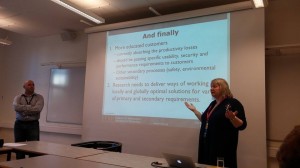
On Monday, BU researchers co-organised a workshop on Evolving Security and Privacy Requirements Engineering (ESPRE) at the 22nd IEEE International Requirements Engineering Conference (RE 2014) in Karlskrona, Sweden. The workshop brought together practitioners and researchers from around the world, who shared their thoughts about how security and privacy can be incorporated into the design of software as early as possible, without compromising productivity or sacrificing innovation. The RE conference series is one of the premier conferences in software engineering, and the ESPRE workshop is the successor of several successful secure software engineering workshops. Shamal Faily (SciTech) organised this workshop, together with colleagues from Germany (University of Duisberg-Essen), South Korea (Ajou University), and the USA (Carnegie Mellon University).
The workshop began with a keynote talk from Professor Angela Sasse (UCL), who described some recent research examining how companies build security into products they develop, and the need to change the discourse around usability and security. Three technical paper sessions followed, before the workshop was concluded with an invited talk by Aljosa Pasic (Atos Research & Innovation) on some of the market trends and business challenges in security engineering. Further information about the workshop itself can be found at http://espre2014.org .
We’re grateful to the Faculty of Science & Technology for co-sponsoring this workshop, and to all the workshop attendees for sharing their work.
Horizon 2020: Forthcoming Funding Opportunities for Creative Businesses
The Horizon 2020 programme is the major funding opportunity for research and innovation initiatives across Europe, and in 2015 there is nearly 600 million Euros available. If this is an area that interests you, it’s worth bookmarking the European Creative Business Network website .
Save the date!
Creative industries will benefit from some of this funding in the next round of calls published on the 15 October 2014, as the topics have already been announced. Here are some of the highlights for creative businesses:
ICT 19: Technologies for creative industries, social media and convergence
This funding aims to support Research and Innovation Actions, or Support for the development of, new or emerging technologies for digital content creation and to unlock complex information and media and interacting with them.
ICT 20: Technologies for better human learning and teaching
The development of digital technologies for learning are crucial to boosting innovation in education. This call will therefore focus on innovative technologies for learning, on underpinning interoperability standards and on the integration of different components into smart learning environments.
ICT 10: Collective Awareness Platforms for Sustainability and Social Innovation – Leadership in enabling and industrial technologies.
By Collective Awareness Platform, the call basically means website or ‘portal’. They are interested in calls that pioneer crowdsourcing/crowdfunding or other forms of social innovation. They want to fund technological solutions to real world problems and are looking beyond the financial impact of the project towards the difference it makes to society.
More details of all of these calls are in the Draft Work Programme.
Visiting Spanish historian researches PR archives
Since June 30, Professor Natalia Rodriguez Salcedo of the University of Navarra in Pamplona, Spain has been a visiting scholar at BU, based in the Corporate & Marketing Communications academic group in The Media School.
During a four-week period, she has undertaken detailed research in the archive of the International Public Relations Association (IPRA), which was the first major PR association established in Europe in 1955. The IPRA archive was developed by Professor Tom Watson in 2011.
It is an important source of information about PR’s evolution in the immediate post-World War 2 world and the field’s international expansion in the second half of the 20th century.
“Archives like that of IPRA are always difficult to find and provide essential material for PR historians,” said Professor Rodriguez Salcedo. She has also undertaken research at BU’s Library, including its special collection of historic PR books. As a result of her research, she and Professor Watson are exploring future research collaboration on the development of the PR sector in Europe, especially philosophical and practices approaches that evolved separately from the US.
Professor Rodriguez Salcedo also observed Professor Watson’s editorial and reviewing roles in developing a six-book series, ‘National Perspectives on the Development of Public Relations’ which is being published by Palgrave-Macmillan. She will be a contributor to the fifth book of the series, ‘Western Europe Perspectives’, with a chapter on the history of public relations in Spain.
During her stay Professor Rodriguez Salcedo, who is a member of the European Public Relations History Network, attended the 5th International History of Public Relations Conference at BU on July 2-3, at which she delivered a paper on the formation of the first Spanish PR consultancy and chaired a conference session.
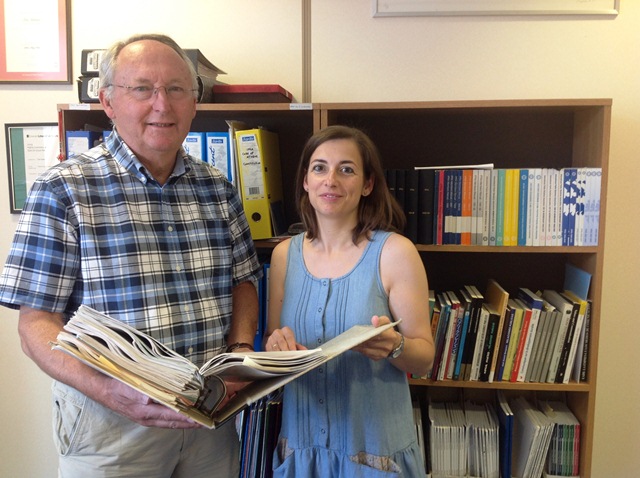
Professor Natalia Rodriguez Salcedo discusses the IPRA archive with its founder, Professor Tom Watson
Research into 3D Printing and Intellectual Property Law presented in Helsinki, Bournemouth and Nottingham
Dr. Dinusha M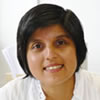 endis, Co-Director of the Centre for Intellectual Property Policy and Management (CIPPM) and Associate Professor in Law was recently invited to present her research in 3D printing and Intellectual Property (IP) law in Helsinki and Nottingham. Dinusha also hosted an event on this topic at Bournemouth University’s Festival of Learning in June 1014.
endis, Co-Director of the Centre for Intellectual Property Policy and Management (CIPPM) and Associate Professor in Law was recently invited to present her research in 3D printing and Intellectual Property (IP) law in Helsinki and Nottingham. Dinusha also hosted an event on this topic at Bournemouth University’s Festival of Learning in June 1014.
In April 2014, Dinusha was invited by the Department of Commercial Law at the Hanken School of Economics in Finland to present her most recent research in 3D printing and IP Law. The talk titled ‘Law and Technological Change: – 3D Printing Technology, New Business Models and Intellectual Property Law‘ explored the paths that intellectual property law may take in the adoption of 3D printing technology with particular emphasis on the utility of “law and technology” as a research method.
In June 2014, Dinusha hosted an event on ‘3D Printing: Understanding the Technology and Law’ at Bournemouth University’s Festival of Learning. The event was run in collaboration with the Media School and the School of Science and Technology. Further details about this event can also be found here.
In July 2014, Dinusha was invited to present her research at the 9th Annual Additive Manufacturing and 3D Printing International Conference. The event hosted by the University of Nottingham and Econolyst Ltd., brings together industry experts from the field of Additive Manufacturing and 3D printing. As an invited speaker, Dinusha spoke on the ‘The Application of UK Copyright Law to 3D Printing and Mass Customisation’. A further insight into the talk can also be found on the Conference blog under the heading ‘Who is the creator: where does UK law stand on IP in 3DP?’
Dinusha continues to carry out both funded and independent research in this area and her most recent article titled ‘3D Printing Enters the Fast Lane’ was published in the Intellectual Property Magazine in July 2014.
The virtual and the field: enhancing visualisation in archaeology using serious game technologies
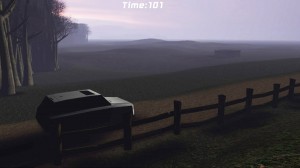 The FIF funded collaborative project between the Creative Technology and Archaeology Frameworks has produced its first output.
The FIF funded collaborative project between the Creative Technology and Archaeology Frameworks has produced its first output.
The aims of the project are to:
- Initiate collaboration between the Creative Technology and Archaeology and Anthropology academic groups.
- Enable Games Technology students to perform interdisciplinary projects with Archaeology students (e.g. the creation of virtual 3D environments or 3D artefacts).
- Provide Archaeology and Anthropology students with 3D research, teaching and learning resources produced with serious game technologies.
In the first of a series of projects a Games Technology student has collaborated with a Forensic Archaeology student to produce 3D environments for use in experiments investigating how individuals interpret and respond to features in the environment. We are now looking to participants to perform the experiment. Please email djohn@bournemouth.ac.uk or i7208298@bournemouth.ac.uk if you want to take part in the experiment.
“3D Printing: Understanding the Technology and Law” at the Festival of Learning
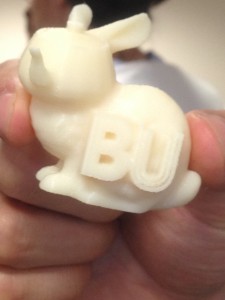 On Monday 9 June, Dr. Dinusha Mendis of the Law Department hosted an event on ‘3D Printing: Understanding the Technology and Law’ at Bournemouth University’s Festival of Learning in collaboration with the Media School and School of Science and Technology.
On Monday 9 June, Dr. Dinusha Mendis of the Law Department hosted an event on ‘3D Printing: Understanding the Technology and Law’ at Bournemouth University’s Festival of Learning in collaboration with the Media School and School of Science and Technology.
The event which was held from 5-7 pm on 9th June 2014 included three short presentations and a tour of the 3D printing facilities at Bournemouth University.
The presentations focused on the various aspects of the technology and law relating to 3D Printing and were delivered by Dr. Leigh McLoughlin of the Media School; Mr. Gary Underwood from the School of Science and Technology and Dr. Dinusha Mendis of the Law Department, Business School.
Following the talks, the attendees were taken on a hands-on tour of the 3D printing facilities at Talbot Campus, Bournemouth University – and did not leave the event empty-handed. Each attendee was given a 3D printed momento to take home – as seen in the picture!
The event was enjoyable and very well attended – generating a wait list after the allocated tickets were sold out. Apart from that, the Festival of Learning provided the perfect platform to showcase the research relating to the legal and technological implications of 3D Printing. With a hands-on tour planned, it also provided the opportunity to engage the attendees in a more light-hearted manner.
The Festival of Learning has also acted as a spring board for a further event in the area of 3D Printing and Intellectual Property Law which will once again be hosted by Dr. Dinusha Mendis at Bournemouth University later this year.
The following video clip captures the essence of the Festival of Learning and provides an insight into the many exciting events which took place during 9-15 June 2014 at Bournemouth University.
Creative England Teams up with Playstation on Accelerator Programme
As part of its ongoing support for the games industry in England, Creative England’s GamesLab Campus programme will invest a total of £250,000 into five Games companies (£50,000 each) to support the development of new and innovative entertainment experiences on PlayStation®3, PlayStation®4 and PlayStation®Vita.
This package of investment will be complemented by a bespoke programme of business support and other technical and fringe benefits including the provision of PS3, PS4 & PS Vita Dev Kits1.
This announcement was made earlier this week at the Develop Conference 2014 , For more information, including how to apply, will be available shortly on our Games section Follow GamesLab on Twitter at @CEGameslab.
Mentoring support available for emergent or established creative companies
Can you answer yes to all these questions or work with a company that can?
- Are you a registered company in the UK
- Have you been trading for a minimum of three years
- Working within one or more of these sectors – advertising, film, TV, digital media
- Have a turnover of £1m.
Ideally your company or the business you are working within will be in the following position:
- Have a scalable business model
- Seeking to reach the next stage of development
- Looking to expand a product or service range; expand into new markets nationally or internationally; develop IP
- Have a good leadership team in place.
The above are desirable criteria. If the £1m turnover is not met but there are ambitions to grow and expand the business, you can still apply as there will be other opportunities in the future. The next round starts in September 2014.
So if you are or you know an ambitious creative company with an appetite for growth and would like practical advice on overcoming the challenges of growing a creative business – why not apply for a mentor?
Click here to find out more
If you are interested and meet the criteria, click here for more information or if you want to find out more details, email NESTA at cbmn@nesta.org.uk or call 020 7438 2635.
To find out more about NESTA click here
New CEMP Bulletin

Here’s the new CEMP research bulletin, the last of this academic year.CEMP bulletin July August 2014
As always, if you are interested in working with us to respond to any of the funding calls here, or if you have an idea for a project that CEMP could help with, please contact Julian, Richard or one of the CEMP Fellows (Milena Bobeva, Anna Feigenbaum, Richard Wallis, Neal White, Ashley Woodfall).
IHPRC celebrates 5th birthday
The International History of Public Relations Conference (IHPRC) celebrated its fifth birthday on the first day of the 2014 conference on Wednesday, July 2.
The conference chair, Prof Tom Watson, was joined in cutting the celebration cake by Prof Don Wright (BostonUniversity), Associate Professor Meg Lamme (UniversityofAlabama) and Associate Professor Natalia Rodriguez Salcedo (UniversityofNavarra), who were members of an advisory panel consulted on the establishment of the conference in 2009.
The conference, which was opened by the Dean of The Media School, Stephen Jukes, has been attended by delegates from more than 12 countries. Some 33 papers and a Keynote Panel have been presented.
More than 150 papers have been offered by delegates from 30 countries in the past five years. The conference has established the field of PR history and spurred a big growth in journal and book publishing, with two more books launched at the 2014 conference.
Planning is already beginning for the 2015 conference to be held on July 7-8.
Dr. Inventor – next generation “Google” search for researchers
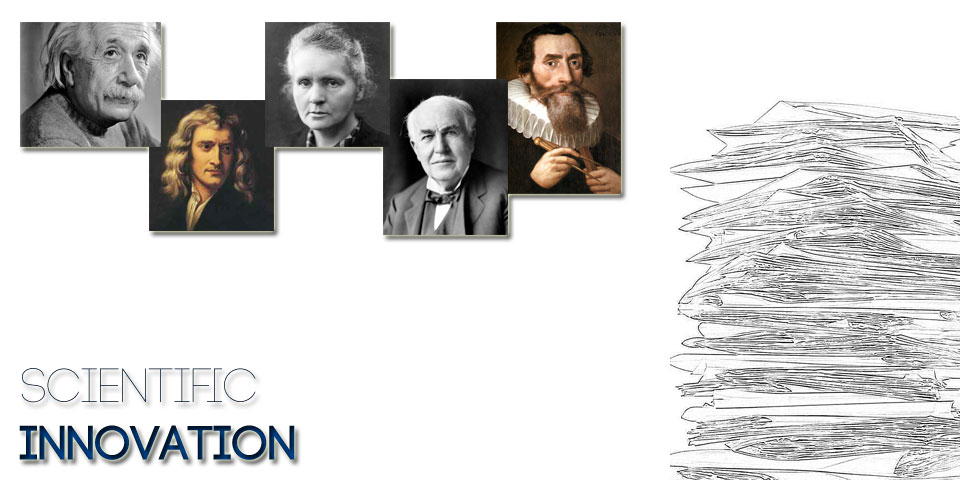
Are you eager to have innovative ideas? Are you keen to find an effective method to solve your research problems? Do you want to speed up your research information collection? Cooperated among eight universities and companies around Europe, we are developing a virtual personal research assistant in our new European Commission funded project “Dr. Inventor – Promoting Scientific Creativity by Utilising Web-based Research Objects”.
 Dr Inventor aims to develop an intelligent software system utilising machine-empowered search and computation to bring researchers extended perspectives for scientific innovation. By informing researchers of a broad spectrum of relevant research concepts and approaches, this system will help assess the novelty of research ideas and offer suggestions of new concepts and workflows for new scientific discovery. Dr Inventor will be the first web-based system that supports the exploration of scientific creativity via a computational approach, which will overcome a lot of human limitations.
Dr Inventor aims to develop an intelligent software system utilising machine-empowered search and computation to bring researchers extended perspectives for scientific innovation. By informing researchers of a broad spectrum of relevant research concepts and approaches, this system will help assess the novelty of research ideas and offer suggestions of new concepts and workflows for new scientific discovery. Dr Inventor will be the first web-based system that supports the exploration of scientific creativity via a computational approach, which will overcome a lot of human limitations.
If you would like our system to work the way you envisage to do, please join our user requirement study by finishing a short survey (taking about 5 minutes) at https://www.surveymonkey.com/s/drinventor. You can tell us how you perform your research tasks, what is the most difficult part in your research, what you wish our system to do to help you. Your feedback will guide our design; your suggestions may steer the way how people undertake research in the next few decades.
Jian J Zhang & Xiaosong Yang
National Centre for Computer Animation, The Media School, Bournemouth University



‘Intelligences’ theme of PR conference
Dr David MacQueen and Prof Tom Watson of The Media School both chaired panels and presented papers at the PR Meeting #4 conference in Barcelona last week.
The conference, which features research on critical approaches to public relations and strategic communication, had a focus on ‘intelligences’ this year.
Dr McQueen chaired a session which included fellow speakers from the the US, Spain and New Zealand. His paper, jointly authored with Graeme Baxter of Robert Gordon University, considered community resistance to corporate power in Scotland and Ireland.
Prof Watson presented a critical review of repetitive research issues in PR, in a session which also included speakers from Australia and Sweden. On the final afternoon of the conference he was a panel speaker on academic writing and publishing.
“This conference is a top event as it has broad international participation and always pushes into new research territory,” said Prof Watson. “This year, it was built around Howard Gardners’s work on intelligences, which brought forward aspects such as competitive, professional, spiritual, digital, emotional, dialogic, wicked and feminist intelligences.”
Entertainment on the move – Innovation Contest
Investment of up to £100k is on offer for digital innovation in the music, publishing and games sectors.
Information in brief:
The IC tomorrow programme aims to stimulate innovation and economic growth in the digital sector and is offering four businesses up to £25k each to encourage digital innovation in the area of entertainment on the move in music, book and magazine publishing and games/interactive entertainment:
- music on the move with the British Recorded Music Industry (BPI)
- books on the move with the Publishers Association (PA)
- magazine content on the move with the Professional Publishers Association (PPA)
- interactive entertainment/games on the move with UK Interactive Entertainment (Ukie).
- Deadline: noon on Tuesday 29 July 2014
- Full details: Click here
- Awards: 4 x up to £25k
Successful BU Festival of Learning debate of media and fear in childbirth!
Yesterday saw the lively debate organised by Prof. Vanora Hundley on the motion: ‘The media is responsible for creating fear in childbirth.’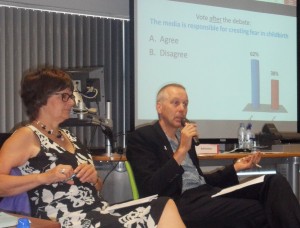
Elizabeth Duff from the NCT and HSC Prof. Edwin van Teijlingen affiliated with the Centre for Midwifery, Maternal & Perinatal Health and against the motion argued Joanne Dewberry (http://joannedewberry.co.uk/about-joanne/ ), independent blogger, journalist and successful business woman and Dr. Ann Luce from BU’s Journalism and Communication Academic Group.
The debate was part of BU’s Festival of Learning event to explore the role of the mass media in shaping such beliefs and identify whether media portrayals are responsible for rising rates of intervention. The audience voted in favour of the motion, but the media team managed to get some people to reconsider their views on the impact of the mass media on women’s view of childbirth.
Professors Vanora Hundley and Edwin van Teijlingen
CMMPH
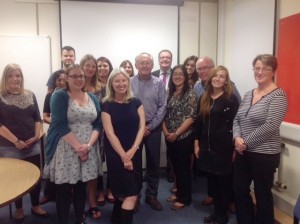



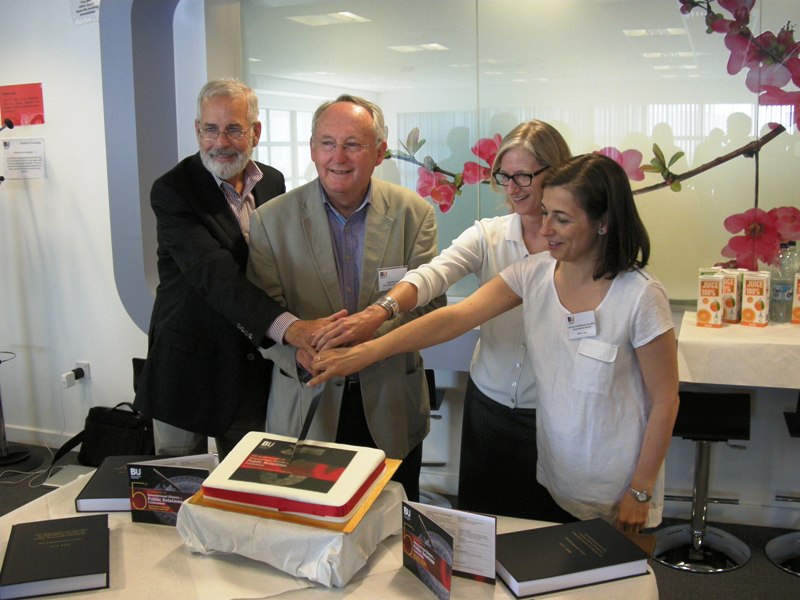












 On Christmas Day in the Morning…
On Christmas Day in the Morning… New Nepal scoping review on maternal & neonatal health
New Nepal scoping review on maternal & neonatal health Fourth INRC Symposium: From Clinical Applications to Neuro-Inspired Computation
Fourth INRC Symposium: From Clinical Applications to Neuro-Inspired Computation Writing policy briefs
Writing policy briefs ECR Funding Open Call: Research Culture & Community Grant – Application Deadline Friday 12 December
ECR Funding Open Call: Research Culture & Community Grant – Application Deadline Friday 12 December MSCA Postdoctoral Fellowships 2025 Call
MSCA Postdoctoral Fellowships 2025 Call ERC Advanced Grant 2025 Webinar
ERC Advanced Grant 2025 Webinar Horizon Europe Work Programme 2025 Published
Horizon Europe Work Programme 2025 Published Horizon Europe 2025 Work Programme pre-Published
Horizon Europe 2025 Work Programme pre-Published Update on UKRO services
Update on UKRO services European research project exploring use of ‘virtual twins’ to better manage metabolic associated fatty liver disease
European research project exploring use of ‘virtual twins’ to better manage metabolic associated fatty liver disease